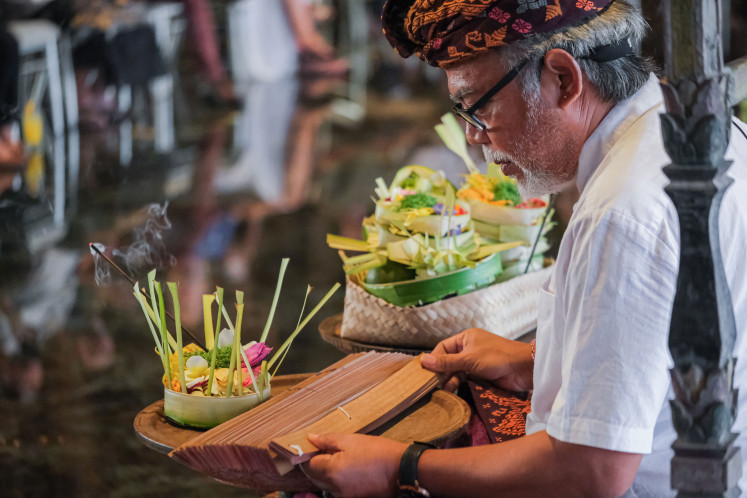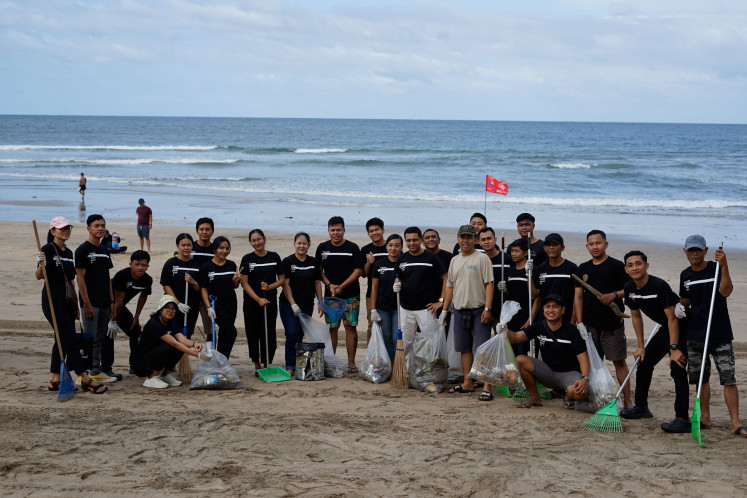Youth Town Hall to raise health awareness among youngsters
Change Size
 United we stand: Ministry of Health – in cooperation with the World Health Organization (WHO) and Center for Indonesia’s Strategic Development Initiatives (CISDI) – will hold a youth town hall meeting in Jakarta on March 20 and 21. Youngsters are expected to lend their helping hands in a collaboration to improve their health. (Courtesy of Ministry of Health)
United we stand: Ministry of Health – in cooperation with the World Health Organization (WHO) and Center for Indonesia’s Strategic Development Initiatives (CISDI) – will hold a youth town hall meeting in Jakarta on March 20 and 21. Youngsters are expected to lend their helping hands in a collaboration to improve their health. (Courtesy of Ministry of Health)
M
inistry of Health -- in cooperation with the World Health Organization (WHO) and Center for Indonesia’s Strategic Development Initiatives (CISDI) -- will hold a youth town hall meeting in Jakarta on March 20 and 21 to raise awareness among youngsters about the importance of having a healthy lifestyle as a requirement to advance the nation.
Acep Somantri, the chief of the ministry’s international cooperation bureau, said the Southeast Asian Region’s (SEAR) Youth Town Hall, which is the first to be held in the region, was to provide a participative platform for youngsters to discuss health and welfare issues affecting them with all stakeholders. During the two-day meeting, the young participants will have the chance to express their views and feedback on how to solve the health problems they face and how they can get involved in health and public welfare programs.
The SEAR Youth Town Hall will be attended more than 1,000 youngsters between the ages of 18 and 39, with the main focus being the 18 to 29 age group. The participants will consist of 1000 youngsters from Indonesia and 50 from 4 other Asian countries, namely Thailand, Myanmar, Bangladesh, India, Nepal, Sri Lanka, Timor-Leste, the Maldives and Bhutan.
Other youngsters from other regions outside of SEAR will also be invited to join to share their views and best practices in dealing with adolescent health and welfare issues. They represent various sectors of civil society, government institutions, academics, business and media, which are relevant to health development programs.
The themes to be discussed will include non-communicable diseases, as well as city, mental and sexual health, reproduction, the reform of health workers, and others. For consultations at regional level, participants will be involved in a participative workshop with short presentations, interactive sessions and group discussions. For national consultations, they will be involved in an interactive panel discussion, in which all participants will deliver reports, and then open consultations in which they will be allowed to express their views.
As a global health platform and in recognition of the youngsters, the WHO and ministry will use the event as a opportunity to get all necessary inputs and recommendations on how to increase the participation and collaboration of the youth in improving the health and welfare of adolescents. Previously, the WHO held the youth town hall meeting in Cairo, Egypt, on Dec.4, 2018, where it managed to involve more than 100 young leaders from six continents.
The significant involvement of youth is the main theme of the youth town hall meeting in Jakarta. In developing countries, like those in SEAR, the youth very often makes up a huge portion of the population. Therefore, their voice and participation should be considered when making decisions, especially on issues that will affect their lives. The 11 countries of SEAR have more than 1.5 billion people who account for a quarter of the world’s population, despite the fact that the region’s member states are categorized as developing countries.
Acep pointed out that the youth town hall meeting was expected to help develop effective strategies involving the youth in development programs, especially in health and welfare development.
“Through the youth town hall meeting, all stakeholders will gain knowledge about the health needs of youngsters in Southeast Asia. All stakeholders will also get input from the youngsters on friendly health services for youngsters and health programs in schools, which will be then used to redesign the existing health services. We’ll also get feedback from the youngsters on how to involve them in the health development activities, and define the main challenges facing them and how to deal with the challenges. Then, with the results of discussions we’ll come up with a plan to deal with the youngsters’ health problems,” he said.
Acep underlined the very important role of the youth in Indonesia, particularly as Indonesia is entering a period called the “demographic bonus” from 2020 to 2035. It is the period when the number of productive people is higher than non-productive ones. The productive people, who will account for 70 percent of the total population of Indonesia during the period of demographic bonus, are those age between 15 and 64. Those below 15 and above 64 are categorized as non-productive people. If Indonesia manages to utilize the demographic bonus for its own benefits, then it is expected to become a developed country. As the youth accounts for a greater portion of the population, they will play a very important role in realizing it.
Acep noted that in Indonesia there were about 65 million youngsters, or 26 percent of the total population of 265 million, in Indonesia. “It’s important, therefore, to give them a chance to take part in the process of taking part in decisions that will affect their lives, particularly their health and public welfare,” he said.
He added that through the youth town hall meeting, the ministry wanted the youngsters to deal with all health challenges.
“They are now facing various kinds of challenges with regards to health. The youngsters are easily exposed to non-healthy lifestyles, such as smoking, consuming junk food and alcoholic as well as not exercising, which can heavily affect their health. Those problems, if not resolved, will negatively affect their lives and hinder Indonesia’s efforts to take advantage of the demographic bonus. So, through the youth town hall meeting we want to change their non-healthy lifestyles. That way we hope we can reap all the benefits from the demographic bonus,” he said.
He pointed out that the results of the meeting will be used by the government to design the next medium-term development planning (RPJM) in the health sector. “So, the youth town hall meeting is also timely for Indonesia, as the government will be designing its RPJM. The results of the meeting will also be used to design health development programs under the RPJM. And I think at global level, this will also be an example for other countries on how to deal with the health problems of youngsters,” he said. (*)









